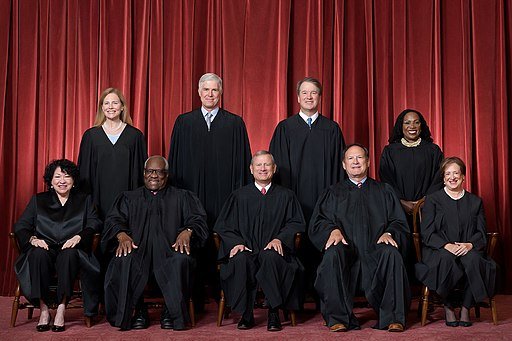"According to respected polls," Ira Shapiro writes at The Hill, "public approval of the Supreme Court has dropped precipitously to the lowest level in the 50 years that it has been measured."
And not, he cautions, not just to recent revelations concerning the less than ethical (those are my polite words for "bribe-accepting") behavior on the part of at least two, and likely more, justices, but because "America has found itself in the grip of an extreme court majority, which shows no respect for the law, precedent, constitutional rights and personal freedom, or the other branches of government."
Personally, I find the current Court a mixed bag on all the metrics Shapiro mentions, but even assuming that it's really as awful as he believes it is, his proposed solution --- term limits, with Chief Justice John Roberts setting the example by retiring now, after 18 years --- doesn't seem likely to fix either the "corruption problem" or the "extremism problem."
Usually when I argue with my libertarian friends who support term limits, the same rosy predictions abound --- it will end political careerism, reduce the time corrupt officials have to monetize their offices, and encourage "citizen legislators" (or, in this case, judges) whose incentives will tend toward "do a good job, then return to private life."
I don't have anything AGAINST term limits, mind you, but they're no panacea. We've had time to see how term limits work at the state level, and they work like this:
A politician maxes out his or her terms in a particular office, then runs for a higher office while working to get a spouse or child or protege installed in the office being vacated. Instead of an "in then out" set of doorways, it becomes an "in then up, dragging a crony onto the now-empty lower step" escalator.
Far from discouraging corruption as such, term limits simply encourage a more carefully planned version of the already familiar phenomenon of building political "machines" and "dynasties." Does the name "Kennedy" ring any bells? How about "Bush?"
And even assuming that an elected or appointed official doesn't game the system that way, the incentive for corruption doesn't disappear. It simply becomes a matter of making hay while the sun shines --- knocking down the biggest bribes possible in the shortest time possible instead of counting on decades in which to amass a fortune.
Might term limits help at the margins, encouraging "citizen politicians" and "respected jurists" to engage in "public service" as an interlude rather than a career? Maybe, but so far performance versus that expectation seems very spotty.
The problem with "limiting" political power in any way is that those who seek such power will always find ways around the limits.

Especially for the legislative branch, term limits are useless since the bureaucracy yields the true power
Downvoting a post can decrease pending rewards and make it less visible. Common reasons:
Submit